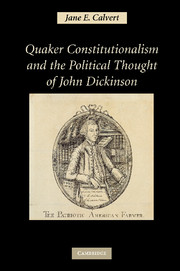Book contents
- Frontmatter
- Contents
- Acknowledgments
- Abbreviations
- Introduction
- I QUAKER CONSTITUTIONALISM IN THEORY AND PRACTICE, C. 1652–1763
- II THE POLITICAL QUAKERISM OF JOHN DICKINSON, 1763–1789
- 6 Turbulent but Pacific: “Dickinsonian Politics” in the American Revolution
- 7 “The Worthy Against the Licentious”: The Critical Period in Pennsylvania
- 8 “The Political Rock of Our Salvation”: The U.S. Constitution According to John Dickinson
- Epilogue: The Persistence of Quaker Constitutionalism, 1789–1963
- Bibliography
- Index
- References
6 - Turbulent but Pacific: “Dickinsonian Politics” in the American Revolution
Published online by Cambridge University Press: 27 July 2009
- Frontmatter
- Contents
- Acknowledgments
- Abbreviations
- Introduction
- I QUAKER CONSTITUTIONALISM IN THEORY AND PRACTICE, C. 1652–1763
- II THE POLITICAL QUAKERISM OF JOHN DICKINSON, 1763–1789
- 6 Turbulent but Pacific: “Dickinsonian Politics” in the American Revolution
- 7 “The Worthy Against the Licentious”: The Critical Period in Pennsylvania
- 8 “The Political Rock of Our Salvation”: The U.S. Constitution According to John Dickinson
- Epilogue: The Persistence of Quaker Constitutionalism, 1789–1963
- Bibliography
- Index
- References
Summary
With the controversy over royal government decided, Pennsylvania turned its attention to the problems with Britain. In the next decade, the same issues at stake in the provincial debate over the Charter would be writ large in a national debate – how best to unify the polity and preserve rights in the face of an unjust government. This and the following chapter form a pair as they describe how the three factions of Quakerism persisted and exerted a tremendous influence on the course of national events. The traditional faction, supported by the withdrawers – who were hardly withdrawn at this point – dominated the Assembly until days before independence and infuriated the Revolutionary leaders. After the royal government controversy was decided, the radical faction temporarily lost all influence in the Assembly, and instead merged with other radical groups. As in this earlier controversy, the coming Revolution raised the question of which constitution Quakers of all sorts and their followers ultimately preferred – their local and peculiarly Quaker constitution or the remote and non-Quakerly constitution of the British Empire, or neither. Throughout it all, Dickinson would remain a mediator and counsel the same course for America as he had for Pennsylvania, adherence to the constitution and peaceful advocacy of rights.
The story of Dickinson's via media between the extremes of withdrawing Quaker pacifism and revolutionary radicalism unfolds in five main episodes: The first is the period of the Stamp Act Controversy in 1765.
- Type
- Chapter
- Information
- Publisher: Cambridge University PressPrint publication year: 2008



